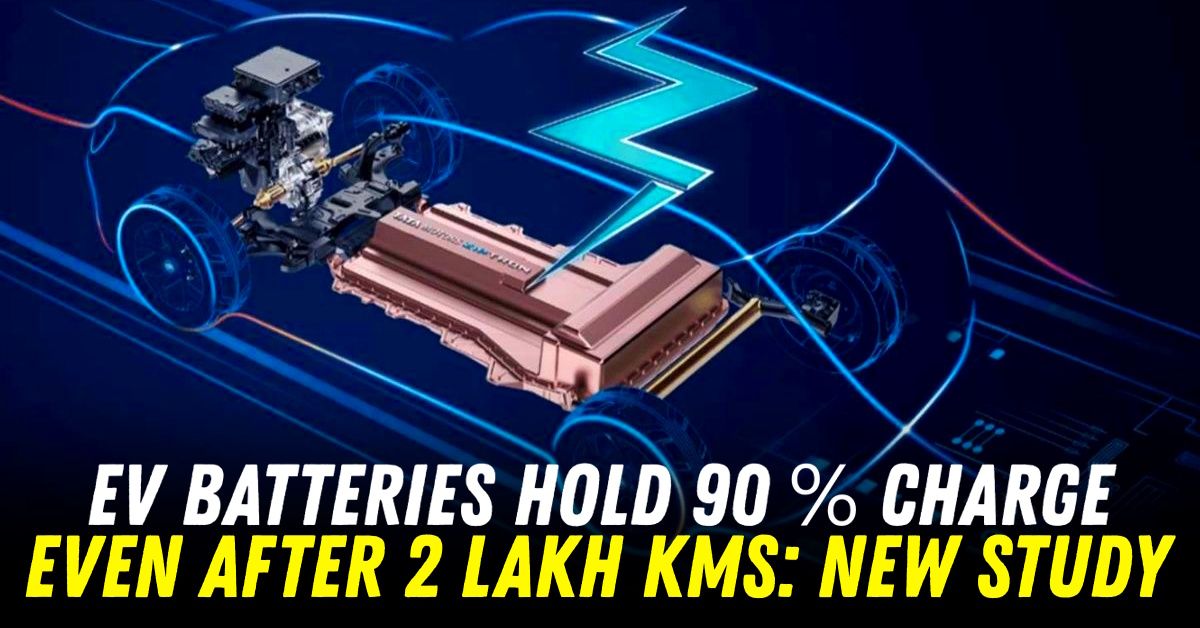EV Batteries Outlast Petrol Cars? New Study Flips the Longevity Debate


A long-standing worry for electric vehicle buyers has been the life of the battery pack. Would it degrade too soon? Would replacing it be more expensive than the car itself? And could a battery electric vehicle realistically last as long as a petrol or diesel car? A recent study throws up an interesting answer. Contrary to popular belief, EV batteries may actually last longer than the vehicles they power, potentially outliving even a typical petrol-powered car.
This revelation comes at a time when battery durability has become a key factor in EV adoption. It’s not just about charging speed or range anymore. People want to know if an EV can go the distance, year after year, without a dramatic drop in performance.
Data compiled by Recurrent Auto from more than 15,000 EVs across brands like Tesla, Hyundai, BMW and Chevrolet reveals a promising trend. On average, these battery packs lost just 2.5 percent of their usable capacity every 1 lakh kilometres. This means even after covering 2 lakh to 3 lakh kilometres, far more than what most private cars clock in their lifetime, many EVs retained over 90 percent of their original battery health.
In simpler terms, if a new EV offers 400 km range, after several years and lakhs of kilometres, it may still comfortably offer 350 to 370 km. That is far from the battery degradation horror stories that often do the rounds. The fear of the battery dying after a few years no longer holds much truth for most mainstream EVs.
Batteries are expensive. For years, this fact has shaped the way people look at EVs. Replacing a battery pack can cost several lakh rupees, especially for premium models. But if the original battery lasts the entire lifetime of the vehicle, this fear becomes irrelevant.
Interestingly, this durability also changes the resale dynamics. Used EVs that have covered significant distances but still retain strong battery health could become more appealing. This may push residual values upward, helping offset the higher upfront cost of an EV compared to a petrol or diesel model.
The impact is already visible in global markets, where long-term EV owners report consistent range even after five to seven years. Anecdotally, some Tesla owners have crossed 3 lakh kilometres without needing a new battery. For comparison, most petrol cars require major repairs or even engine replacements by that mark.
The comparison between battery life and internal combustion engine life has always leaned in favour of petrol and diesel, until now. An average petrol engine starts showing wear and tear around the 1.5 lakh to 2 lakh kilometre mark. Major parts like timing chains, gearboxes, and cooling systems begin to falter. For EVs, such mechanical complexity is absent.
Electric motors are simpler, have fewer moving parts, and don’t require regular oil changes or clutch replacements. This mechanical simplicity, coupled with durable battery packs, suggests EVs could outlive their petrol-powered counterparts in both mileage and ownership duration.
While the study paints a positive picture, not all EVs are created equal. Battery degradation still depends on external temperature, charging patterns, driving habits and thermal management systems.
Brands like Tesla and Hyundai are known for effective battery cooling systems, which help preserve long-term performance. On the other hand, lower-cost EVs without active cooling may not show the same level of durability in extreme conditions.
For hot and humid climates, or regions with poor charging infrastructure, degradation rates may still be higher than global averages. However, the trend suggests that battery failure is no longer the inevitability it was once feared to be.
This shift in battery longevity data could have ripple effects on how buyers think about EVs. Instead of a 5-year plan, they can now start planning 10 years and beyond. With software updates, over-the-air improvements and fewer maintenance headaches, the longer-term case for EVs gets stronger.
The most compelling takeaway? It may soon be time to stop asking how long will the battery last and start asking what will I do with all that extra life left in it. Whether it's repurposing the pack for home energy storage or simply extending ownership, battery packs are finally proving they're up for the long haul.
Via InsideEVs